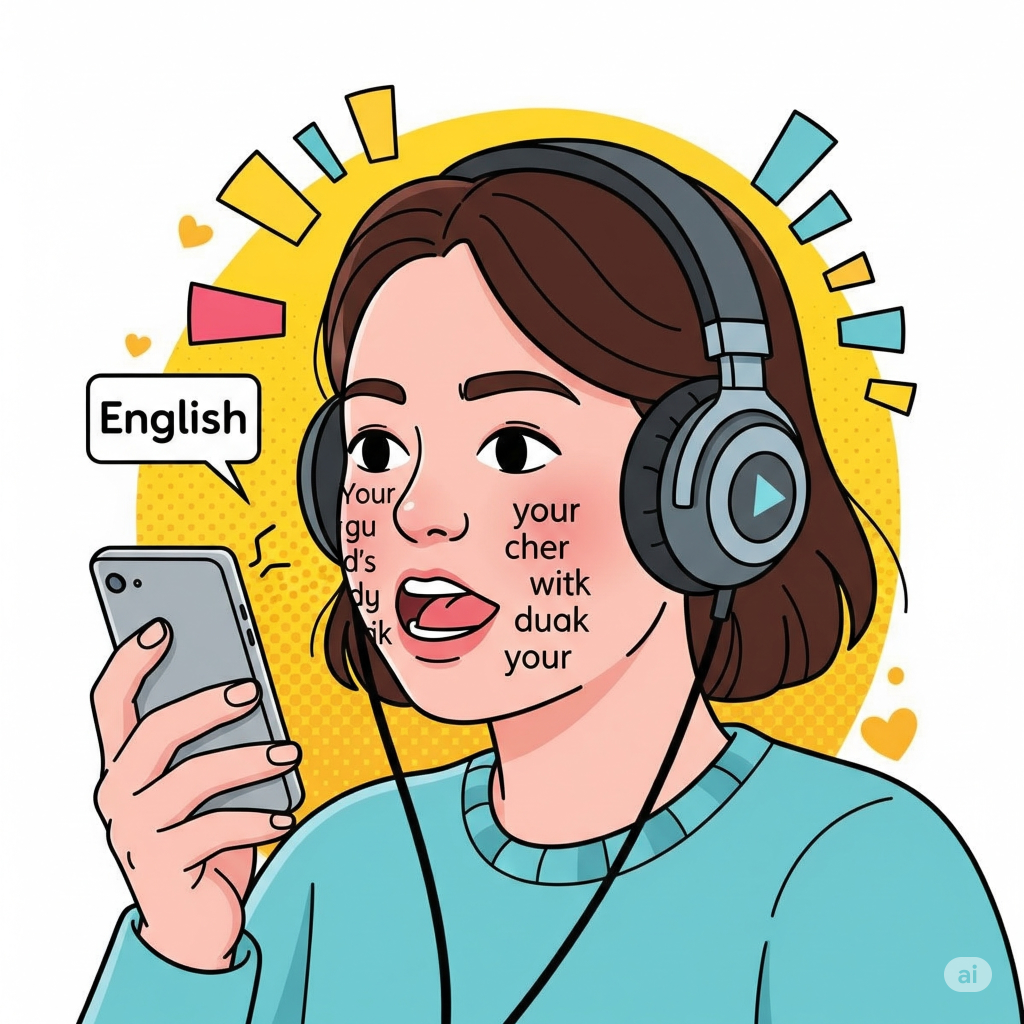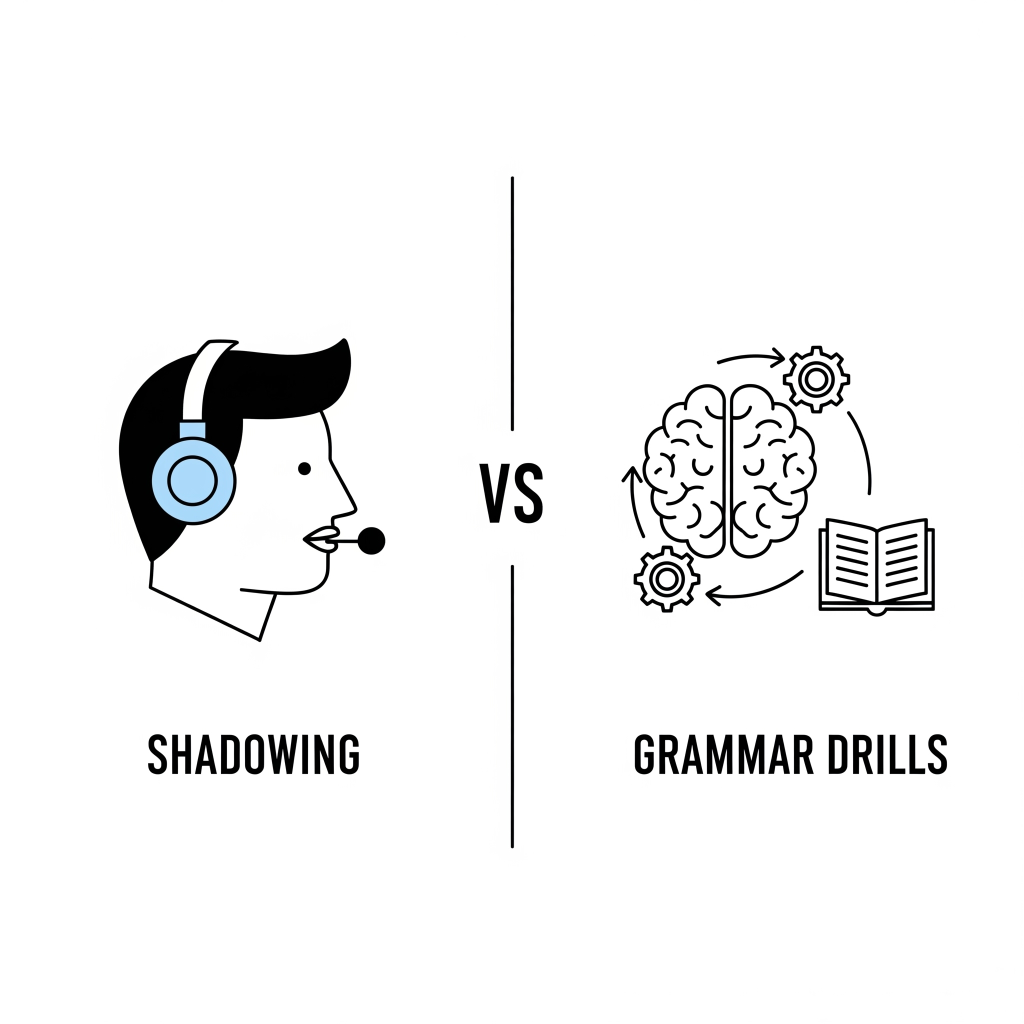Ever tried speaking English and felt like your brain was buffering on dial-up? Yeah, been there. Words disappear, your tongue rebels, and you end up sounding like a confused robot. Welcome to the club. But guess what? There’s a ridiculously simple (yet wildly underrated) method to snap out of it—the shadowing technique.

No, it’s not witchcraft. No grammar drills. No soul-crushing verb charts. Just real, sweaty, out-loud speaking practice. You mimic native speakers like you’re auditioning for a Netflix show—and guess what? Your fluency skyrockets.
Let’s talk about how this weird little habit can actually help you speak English like someone who’s not in constant panic mode. If you’re also looking to reinforce your speaking with some strong grammar basics, check out our post on simple sentences in English or dive into cleft sentences for emphasis.
Shadowing Technique: What on Earth Is It?
Here’s the gist: you listen to English audio and immediately repeat it out loud. No delay. No pauses. Just copy the speaker like a vocal stunt double. Copy their tone, rhythm, and even that weird laugh if you want bonus points.
This isn’t “chill with a podcast” time. You’re in it. Your brain and mouth sync up like an awkward but determined dance duo. And eventually? Magic.
Why does this work? Because it’s how toddlers become little chatterboxes. Humans learn by mimicking. Shadowing hijacks that biological trick and applies it to your poor adult brain that’s been tortured with grammar rules since high school.
For even more support, you can use our free grammar checker tool to clean up your written practice in parallel.
Why Shadowing Isn’t Just Another Learning Gimmick

Here’s why shadowing slaps:
1. Fluency? You Got It
You’re forced to keep up with real speech. No time for overthinking. You learn to speak like you mean it, not like you’re translating Morse code.
2. Pronunciation Without Tears
By echoing native speakers, you sneakily pick up their flow, stress, and rhythm. Your accent gets an upgrade without you even noticing.
3. Your Ears Level Up
You’ll start catching all the stuff your brain usually skips—like contractions, slang, and subtle stress changes.
4. Confidence Grows (Whether You Like It or Not)
You’re speaking more. Out loud. Regularly. This turns down the fear meter and gives you the guts to speak in the real world.
5. Finally, Practice That Feels Like Practice
Forget passive listening and grammar purgatory. Shadowing is intense, useful, and—dare I say—fun?
Case Study: Melis, a student in Ankara, shadowed TED Talks 20 minutes a day. In 3 weeks, she went from awkward pauses to actual conversations. She didn’t cry once.
How to Shadow (Without Looking Like a Lunatic)
You don’t need a $500 app or a teacher breathing down your neck. You need a phone, some decent audio, and the courage to speak English while pacing around your kitchen.
Step 1: Pick Audio That Doesn’t Bore You to Death
Use:
- TED Talks
- YouTube channels like Rachel’s English or BBC Learning English
- Podcasts (All Ears English, The English We Speak)
- Audiobooks (yes, even Harry Potter)
Or reinforce with phrasal verbs in context, because why stop at just repeating when you can also understand?
Step 2: Just Listen First
Seriously, don’t jump in yelling. Get a feel for the content. Know what’s happening.
Step 3: Shadow One Sentence at a Time
Hit play, pause, repeat out loud. Match:
- Rhythm
- Emotion
- Volume
- That little sarcastic tone if they use it
Step 4: Shadow Longer Segments
Level up by doing 30–60 second chunks without stopping. Warning: this will make your brain sweat.
Step 5: Record Yourself (Yes, Really)
You’re gonna hate it. Do it anyway. Hearing yourself helps fix mistakes and makes you appreciate how far you’ve come.
The 21-Day Plan to Stop Sounding Like a Tourist
| Days | What to Shadow | How Long |
|---|---|---|
| 1–3 | Simple sentences, slow speed | 10 mins |
| 4–7 | Basic conversations | 15 mins |
| 8–12 | Full paragraphs, normal pace | 20 mins |
| 13–17 | Real convos (fast, emotional, messy) | 25 mins |
| 18–21 | Shadow at full speed like a boss | 30 mins |
Pro Tip: Use the same material for 2–3 days. Repetition = magic.
You can even align this with a 21-day English vocabulary challenge for max impact.
Will I Be Fluent in 21 Days?
Let’s be real—you won’t wake up with a British accent and a job at the UN. BUT:
- Your speech will be smoother
- You’ll hesitate less
- You’ll sound less like Google Translate
Practice daily and you’ll notice the difference. Skip days and… well, don’t skip days.
“I used to panic when talking to baristas. Now I flirt with them. In English.” — Yusuf, 35, Istanbul
FAQ: The Weird Questions You’re Too Embarrassed to Ask
Can I do this if I’m a beginner?
Yes, if you’re at least A2 level. Start with slow audio and short phrases.
How much time should I spend?
15–30 focused minutes a day. No multitasking. This is sacred time.
What if I don’t understand everything?
Good. That’s normal. You’re training your ear and mouth, not writing essays.
Do I need to sound perfect?
Absolutely not. Shadowing is about progress, not perfection.
Can kids use it too?
Yup. They’re naturals. Adults just need more coffee and patience.
For more listening hacks, check out our discourse markers guide.
Final Pep Talk: Start Talking, Now
This is your cue. Don’t just “study” English. Speak it. Mess it up. Shadow until you can’t help but sound fluent.
It’s weird. It’s powerful. It works.
Pick a video. Plug in your headphones. Repeat like your language dreams depend on it—because they kind of do.
You got this. Your accent won’t know what hit it.
